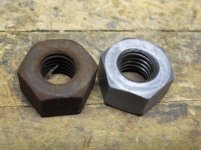i thought i would share my latest findings.
if you have light (surface) rust, a saturated citric acid solution will work well and not discolor steel like other methods. let it soak overnight, rust will be gone and a polished surface still shiny. its especially interesting if the part is large, because citric acid costs nearly nothing. i got 11 lbs for $15 and that is food grade. this gives you 10 gallons of solution for around $2.
i left a polished piece of mild steel in there for 3 days and it got a very light coating (i wonder what it is) that was removed with a kitchen sponge quickly. nothing like the black phosphate you get with phosphoric acid. unlike vinegar (the other inexpensive rust remover) citric is odorless.
if you have light (surface) rust, a saturated citric acid solution will work well and not discolor steel like other methods. let it soak overnight, rust will be gone and a polished surface still shiny. its especially interesting if the part is large, because citric acid costs nearly nothing. i got 11 lbs for $15 and that is food grade. this gives you 10 gallons of solution for around $2.
i left a polished piece of mild steel in there for 3 days and it got a very light coating (i wonder what it is) that was removed with a kitchen sponge quickly. nothing like the black phosphate you get with phosphoric acid. unlike vinegar (the other inexpensive rust remover) citric is odorless.


